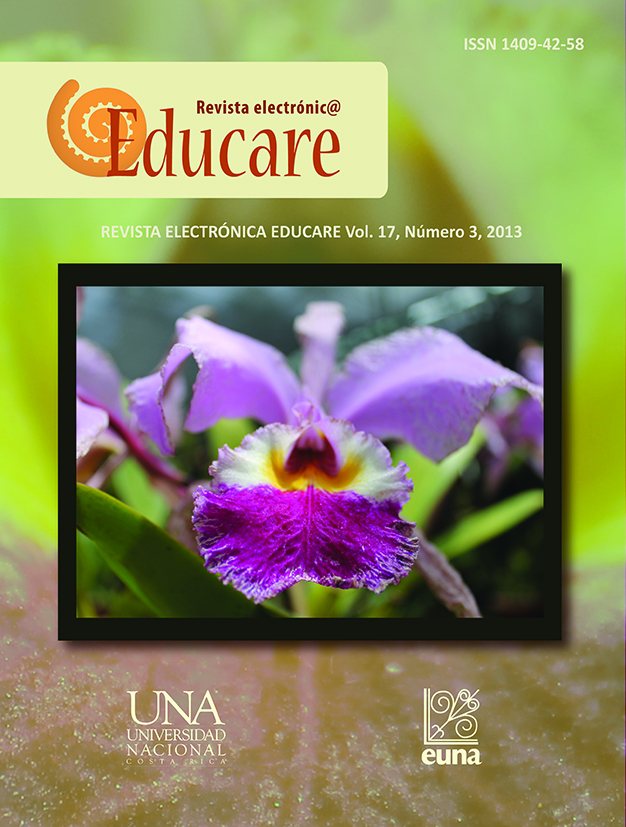Implementation of Skills for Life for an Appropriate Approach to Men’s Conflicts: A View from the New Masculinities
DOI:
https://doi.org/10.15359/ree.17-3.7Keywords:
Masculinity, conflict resolution, skills for life, social skills, cognitive skills.Abstract
This paper refers to the implementation of skills for life for an appropriate approach to men’s conflicts: a view from the new masculinities. The objective is to understand how the implementation of the skills for life approach can contribute to find alternatives that would promote prevention, as well as an appropriate approach to conflicts and conflict resolution by male population. It studies the main canons of masculinity, conflict resolution, and skills for life. It concludes calling attention to the implementation of skills for life in the strengthening of masculinities raising awareness of the importance of gender equality and equity as part of self-fulfillment.
References
Boscán, A. S. (abril-junio, 2008). Las nuevas masculinidades positivas. Utopía y praxis Latinoamericana, 13(41), 93-106. Recuperado de http://dialnet.unirioja.es/servlet/listaarticulos?tipo_busqueda=EJEMPLAR&revista_busqueda=9559&clave_busqueda=199727
Caballo, V. E. (2007). Manual de evaluación y entrenamiento de las habilidades sociales (7ª ed.). España: Siglo XXI de España Editores.
Cascón, P. (2001). Educar en y para el conflicto. Barcelona: UNESCO, Escola de Cultura de Pau. Recuperado de http://www.bibliotecavirtual.info/2012/11/educar-en-y-para-el-conflicto/
Castro, M. E. y Llanes, J. (2009). Desarrollo de habilidades para la vida = prevención. Liberaddictus, 97, 113-116. Recuperado de http://www.documentacion.edex.es/docs/1008CASdes.pdf
Delgado, H. (2002). El papel de la procuraduría en el nuevo milenio. Nueva visión de la teoría del conflicto. San José, Costa Rica: Procuraduría General de la República.
Hardy, E. y Jiménez, A. L. (2001). Masculinidad y género. Revista Cubana Salud Pública, 27(2), 77-88. Recuperado de http://bvs.sld.cu/revistas/spu/vol27_2_01/spu01201.pdf
Hernández, S. M. (julio-diciembre, 2009). Perfiles de la masculinidad. Fuentes Humanísticas, 21(39), 149-153.
Hsieh, S. W. (marzo, 2012). Femicidio, un indicador de violencia social hacia la mujer. Medicina Legal de Costa Rica, 29(1), 79-82. Recuperado de http://www.scielo.sa.cr/pdf/mlcr/v29n1/art9.pdf
Kaufman, M. (1989). Hombres: Placer, poder y cambio. Santo Domingo: CIPAF.
Krauskopf, D. (1997). Adolescencia y Educación. San José, Costa Rica: EUNED.
Mantilla, L. (2002). Habilidades para la vida. Una propuesta educativa para convivir mejor. Bogotá: Fe y Alegría. Recuperado de http://www.documentacion.edex.es/docs/0310MANhab.pdf
Menjívar, M. y Alvarado, C. (2009). Hombres que impulsan el cambio: Manual para la prevención de la violencia y la promoción del crecimiento personal desde una perspectiva de la masculinidad (Colección Tenemos derecho a tener derechos, 18). San José, Costa Rica: INAMU. Recuperado de http://www.redxlasalud.org/index.php/mod.documentos/mem.detalle/id.938
Montesinos, R. (julo-agosto, 2004). Los cambios de la masculinidad como expresión de la transición social. El cotidiano, 20(126), 1-16. Recuperado de https://docs.google.com/viewer?url=http://www.redalyc.org/pdf/325/32512622.pdf&chrome=true
Montesinos, R. (2007). Perfiles de la masculinidad. México: Universidad Autónoma Metropolitana.
Rivera, R. y Ceciliano, Y. (2004). Cultura, masculinidad y paternidad: Las representaciones de los hombres en Costa Rica. San José, Costa Rica: FLACSO.
Valor-Segura, I., Expósito, F. y Moya, M. (2009). Desarrollo y validación de la versión española de la Spouse-Specific Dependency Scale (SSDS). International Journal of Clinical and Health Psychology, 9(3), 479-500. Recuperado de http://www.aepc.es/ijchp/articulos_pdf/ijchp-334.pdf
World Health Organization (WHO). (1994). Life Skills Education for Children and Adolescents in Schools [Enseñanza en los colegios de las habilidades para vivir]. Ginebra: Autor.
Downloads
Published
How to Cite
Issue
Section
License
1. In case the submitted paper is accepted for publication, the author(s) FREELY, COSTLESS, EXCLUSIVELY AND FOR AN INDEFINITE TERM transfer copyrights and patrimonial rights to Universidad Nacional (UNA, Costa Rica). For more details check the Originality Statement and Copyright Transfer Agreement
2. REUTILIZATION RIGHTS: UNA authorizes authors to use, for any purpose (among them selfarchiving or autoarchiving) and to publish in the Internet in any electronic site, the paper´'s final version, both approved and published (post print), as long as it is done with a non commercial purpose, does not generate derivates without previous consentment and recognizes both publisher's name and authorship.
3. The submission and possible publication of the paper in the Educare Electronic Journal is ruled by the Journal’s editorial policies, the institutional rules of Universidad Nacional and the laws of the Republic of Costa Rica. Additionally, any possible difference of opinion or future dispute shall be settled in accordance with the mechanisms of Alternative Dispute Resolution and the Costa Rican Jurisdiction.
4. In all cases, it is understood that the opinions issued are those of the authors and do not necessarily reflect the position and opinion of Educare, CIDE or Universidad Nacional, Costa Rica. It is also understood that, in the exercise of academic freedom, the authors have carried out a rogorous scientific-academic process of research, reflection and argumentation thar lays within the thematic scope of interest of the Journal.
5. The papers published by Educare Electronic Journal use a Creative Commons License:














 The articles published by Educare Electronic Journal can be shared with a Creative Commons License:
The articles published by Educare Electronic Journal can be shared with a Creative Commons License: 



